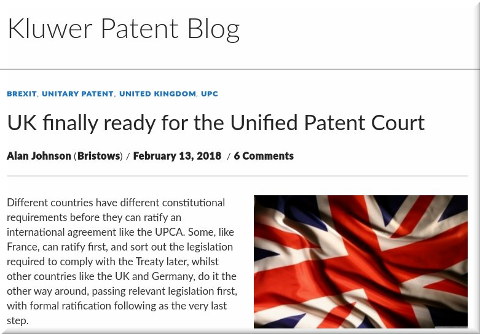

JUST before the weekend we noted that the EPO had virtually stopped talking about the UPC. The acronym or the words "unified" and "unitary" recently escaped the EPO's lexicon. It wasn't always like that.
"They're also totally silent regarding the inaction some days ago in the British political scene (Bristows too chose to remain silent about it)."We mentioned the context to this before; "Indications so far mostly point to admissibility," I told him, "including next week's debate in Bavaria" (it's only a couple of days away).
What we found fascinating, however, was this new self-promotional piece from Joff Wild (IAM). A year ago IAM was pushing fake news about the UPC [1, 2, 3] (after the EPO's PR firm had paid IAM). Now? Not so much optimism. They're also totally silent regarding the inaction some days ago in the British political scene (Bristows too chose to remain silent about it).
To quote the portion about UPC:
Brexit and the UPC: Of course, no patent-related event in Europe these days is going to escape discussion of either Brexit or the potential impact of the Unified Patent Court – should it ever get up and running.
On the former, there was wide agreement that as things stand, no-one has much idea what is going to happen. Patents and patent owners are not directly affected by Brexit because there is no unitary patent system in Europe, but it was noted that over recent years there has been a trend for European patent judges to spend more time talking to each other, with courts in one country now prepared to give much more weight to judgments handed down in others when hearing similar cases. As England and Wales is perhaps Europe’s most important life sciences venue, there is no doubt that decisions reached by judges in the jurisdiction are currently looked at very closely by their peers elsewhere. Whether this will continue post-Brexit remains to be seen.
As for the UPC, there was widespread scepticism about it seeing the light of day pre-Brexit and around the UK’s participation in the system at any time. However, some at least are continuing to make preparations on the off chance that the UK does ratify the UPC Agreement and the case currently before the German constitutional court on the legality of Germany’s ratification goes nowhere quickly. One interesting point raised was whether the opting in and opting out regime might give rise to generic companies making accusations of patent owners gaming the system, with all the consequences that might have as they seek to enforce their rights. Like the UPC itself, it was an issue left hanging in the air. Perhaps one day, though, we might find out whether it has some legs.